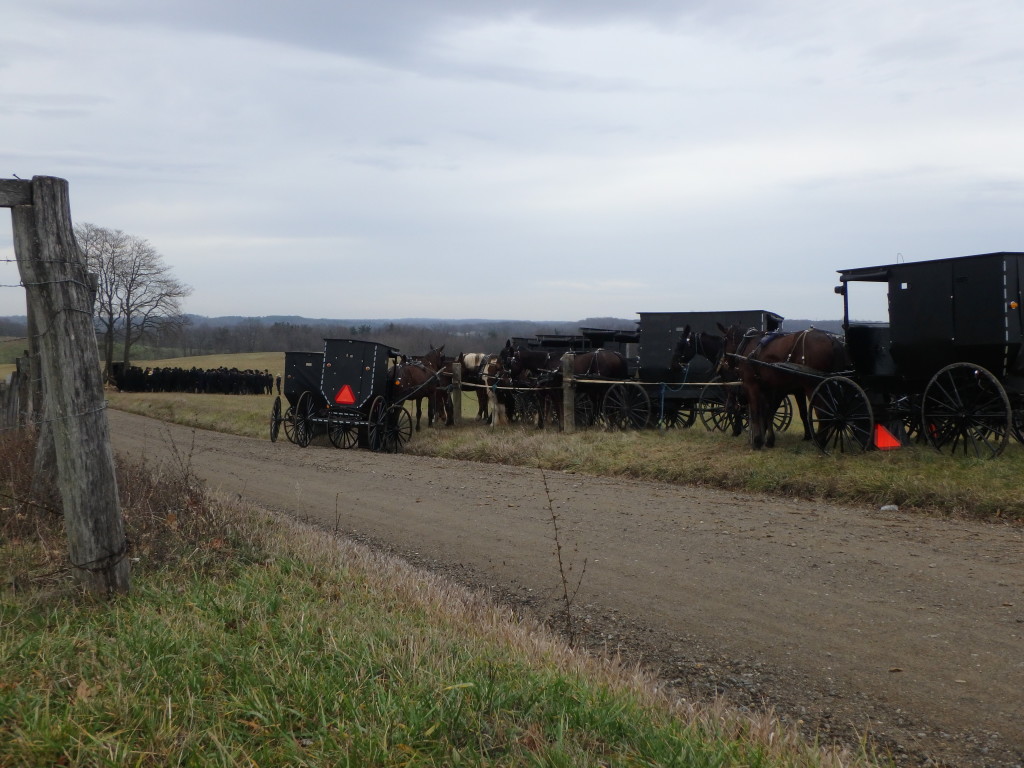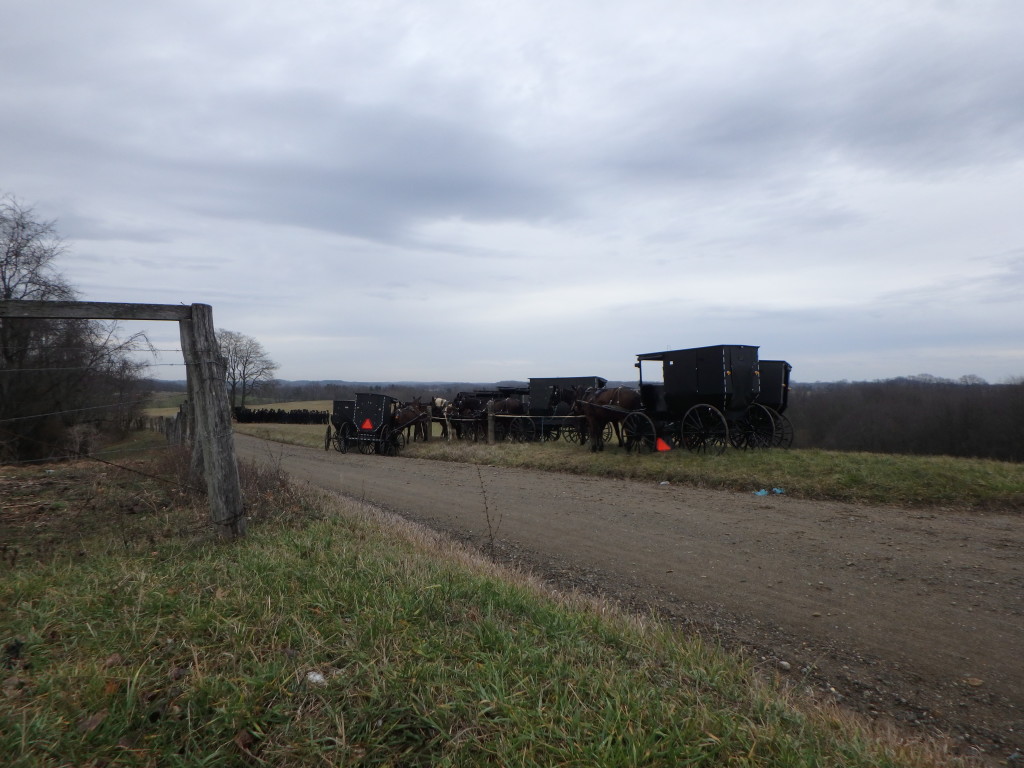Dunkerque  The latter half of Christmas morning I spent at a funeral. One of the Amish families had just lost their two-week-old baby. The family lived nearby – I had already met the child’s great-uncle – and I knew another family we knew here would be there. But there was another reason I wanted to go. Cicero, in his meditations on death, reports that the Greek philosopher Anaxagoras met the news of his son’s death calmly: “I knew, when I fathered him,” he said, “that he was mortal.” My life has seen an almost uninterrupted run of good fortune, and a great abundance of life, this year. But I feel the presence of that other thing, that mortality that bounds all we know and feel. I know that it is all fragile, and all destined to return to the earth. I just recently read a generally intelligent woman writing about what she felt was the absurdist cruelty of the Incarnation: that a child be born for the express purpose of having his life sacrificed. What wilful blindness in her, I thought – we are all brought into the world on these conditions. I felt a desire to draw closer to this truth, and look it in the face for awhile.
The latter half of Christmas morning I spent at a funeral. One of the Amish families had just lost their two-week-old baby. The family lived nearby – I had already met the child’s great-uncle – and I knew another family we knew here would be there. But there was another reason I wanted to go. Cicero, in his meditations on death, reports that the Greek philosopher Anaxagoras met the news of his son’s death calmly: “I knew, when I fathered him,” he said, “that he was mortal.” My life has seen an almost uninterrupted run of good fortune, and a great abundance of life, this year. But I feel the presence of that other thing, that mortality that bounds all we know and feel. I know that it is all fragile, and all destined to return to the earth. I just recently read a generally intelligent woman writing about what she felt was the absurdist cruelty of the Incarnation: that a child be born for the express purpose of having his life sacrificed. What wilful blindness in her, I thought – we are all brought into the world on these conditions. I felt a desire to draw closer to this truth, and look it in the face for awhile.
is it legal to buy isotretinoin online I did not know precisely where the burying-ground was, so I came down the dirt road carefully, looking in all directions, and at last I saw, up ahead, two large black masses by the side of the road: at first I could not tell what they were. As I got closer I realized that the further one was the row of black hearses, and black horses, parked at the edge of the field; and the nearer one the knot of black-clad mourners, gathered in a solid mass at the edge of the field. I had to drive past the mourners to reach the parking area, which made me feel terribly self-conscious, but there was no help for it. As I drove by the ashen faces of the mourners turned to watch me. I continued to the parking area, and walked back toward the gravesite. The gravel of the road crunched beneath my feet, and embarrassed by the noise of my approach I climbed up into the field to walk on the silent grass.
I do not think I have seen any scene so purely mournful as this: the dark light of deep winter, the distant views of winter fields and gray skies, and the mourners closely gathered round, the women on one side, all clad in black cloaks and black bonnets, the men opposite them, in suits and brimmed hats of dark blue or black, their dark carriages and dark horses waiting for them in rows at a quarter-mile’s distance. As I approached I could see that my appearance made some disturbance in the assembly: I could see one woman lean in to her neighbor, looking at me, to ask who I was; I could see the other woman reply that she did not know. There were only two other men not in Amish mourning garb besides myself, both of them known to the others present. I was a stranger.
An older man with full beard and shaven lip and cheeks spoke the prayers, without book, all in German; I could tell only that it was about “the Prophet David,” and his “junge kinder” – I presume referring to the passage from Samuel, when David’s first child with Bathsheba dies:
After Nathan had gone home, the Lord struck the child that Uriah’s wife had borne to David, and he became ill. David pleaded with God for the child. He fasted and spent the nights lying in sackcloth on the ground. The elders of his household stood beside him to get him up from the ground, but he refused, and he would not eat any food with them.
On the seventh day the child died. David’s attendants were afraid to tell him that the child was dead, for they thought, “While the child was still living, he wouldn’t listen to us when we spoke to him. How can we now tell him the child is dead? He may do something desperate.”
David noticed that his attendants were whispering among themselves, and he realized the child was dead.
“Is the child dead?” he asked.
“Yes,” they replied, “he is dead.”
Then David got up from the ground. After he had washed, put on lotions and changed his clothes, he went into the house of the Lord and worshiped. Then he went to his own house, and at his request they served him food, and he ate.
His attendants asked him, “Why are you acting this way? While the child was alive, you fasted and wept, but now that the child is dead, you get up and eat!”
He answered, “While the child was still alive, I fasted and wept. I thought, ‘Who knows? The Lord may be gracious to me and let the child live.’ But now that he is dead, why should I go on fasting? Can I bring him back again? I will go to him, but he will not return to me.”
In between the words of the officiant, a chorus of men sang a simple, repeated chant. Two young men worked the shovels, filling in the small hole made in the earth for the body of this child. It was the very smallness of the grave which made me tear up, when I caught a glimpse of it through the bodies standing around it. And even so it took an awful amount of time to fill the deep grave, one shovel-full at a time. The prayers continued, and the chants, for a time; and then the shovels worked in silence, and the people talked. Several of the men introduced themselves to me, and thanked me for coming out; they asked me about my situation, and I offered my condolences. One of the young men, the uncle of the child, told me the child had died from a chromosomal defect (the Amish are supposedly more susceptible to genetic problems, because of their small gene pool); but, he added, this was the first of the family’s sixty grandchildren to die. “First death in the family,” he said. The men’s effort to welcome me was truly noticeable and, I thought, laudable.
The women stood on the other side, gathering the children into their cloaks; some of the women were crying, but in general a stoic silence prevailed. There were no Mediterranean histrionics: these people suffered in silence. The black cloaks and bonnets of the women made their ashen complexions leap out of the darkness; I had never seen anything like them except in Northern-Renaissance paintings. When the shovels had stopped again, the officiant offered a final blessing, and the crowd slowly dispersed. People talked, but in a subdued way; the children (who were all silent and well-behaved until now) began running through the fields. Their black forms coursing up and down the hills were beautiful to watch. The horses began to snort as their masters returned to them and untied them; and the clop of hooves and rattle of wheels began. The grave was left as a mound of earth, marked by two iron bars (which I believe were only to lower the casket and would be removed later); there were no flowers or other offerings. There were no other graves: it was a new burying-ground, and this had been the first body laid in this earth. Many of the women took small stones from the gravesite and carried them away; I presume it is custom; some carried several in their hands as they walked away.
There was a reception afterward, at the family home, with food; but I had played the part of stranger enough, and I returned home.

Post a Comment